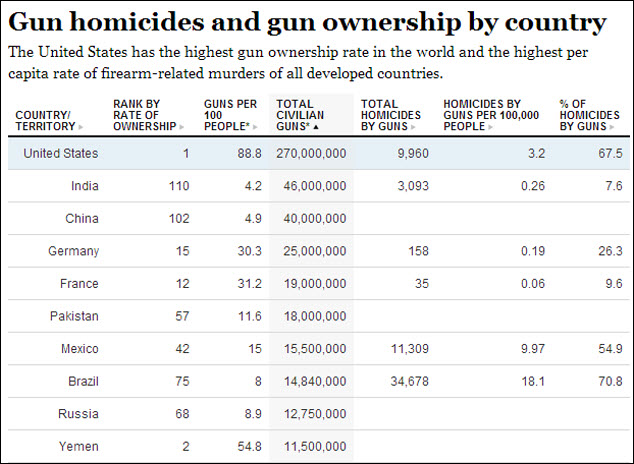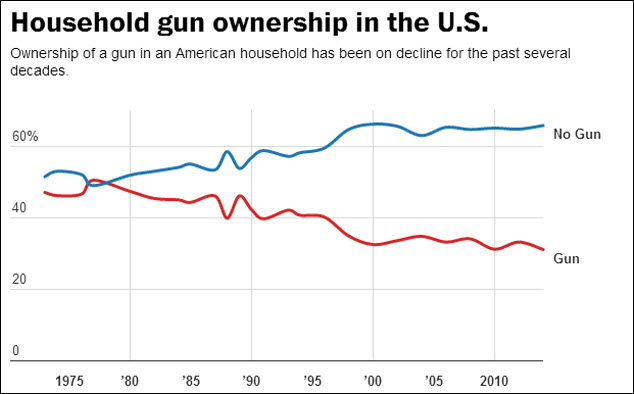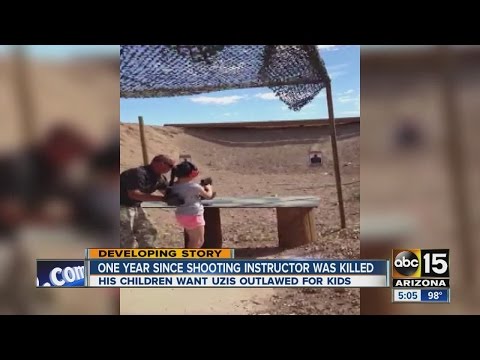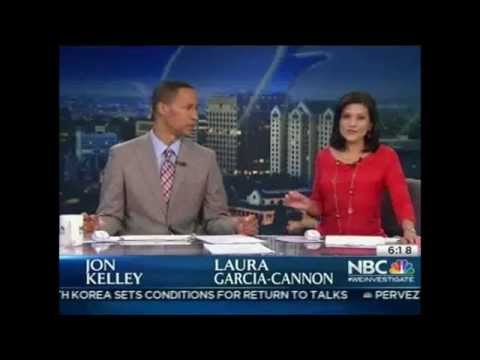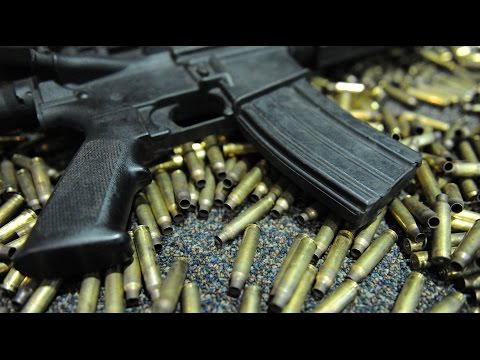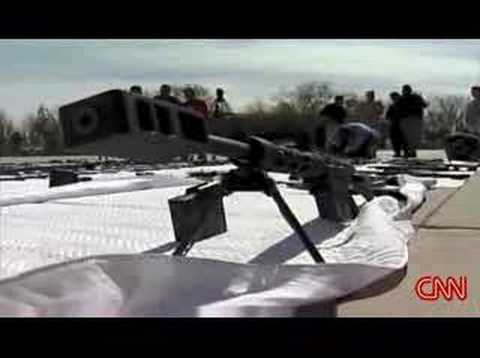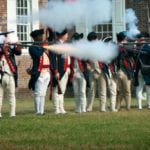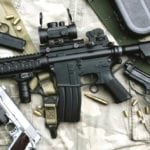SEE ALSO: 10 Myths About Guns And Gun Control It’s a debate we’ve covered before, once from the pro–gun control side and once from the anti–gun control side. But this seems as good a time as any to revisit the facts surrounding guns in the US. After shunting aside the propaganda, there are some indisputable points to be made about guns and gun violence in America.
10 America Owns Nearly Half The World’s Civilian Guns
Although it’s the third most populous nation on Earth, the US has less than 5 percent of the global population living within its borders, compared to nearly 20 percent of the world’s population living in China. But if you look at gun statistics, you’d be forgiven for thinking that the US must be the biggest country on Earth. Nearly half of the world’s civilian-owned firearms are in America. This means that the US has more civilian guns than literally any other country on Earth, with an estimated 270 million in circulation. India, which has the second highest, has about a sixth of that number. The US also has the highest per capita gun ownership, with 88.8 guns for every 100 citizens. That’s nearly double America’s closest OECD rival, Switzerland, which comes in third, toting a mere 45.7 guns per 100 citizens. Yemen is second with 54.8. Yet even these are stratospherically high ratios. France, Germany, and Austria each have around 30 guns per 100 citizens, while England and Wales have an unbelievably tiny 6.2.
9 But Only A Third Of American Households Actually Own Guns
Given the sheer numbers of guns flowing through the country, plus their absolute ubiquity in popular culture, you’d be forgiven for thinking that everyone and their grandma is packing heat in America. Yet the numbers don’t bear this out. Not only do most Americans not own a gun, the number of US households that own guns is actually declining. From a 1977 high of slightly over 50 percent of American households, levels of gun ownership have steadily declined to an all-time low of just 31 percent of households having guns. But even as the number of households with guns has plummeted, the number of guns entering circulation each year has risen dramatically. Back in 1986, when households with guns was only slightly below 50 percent, around three million new guns were produced each year. This figure stayed fairly steady until the mid-2000s, when it suddenly skyrocketed. As of 2012, the number of new guns appearing each year has risen to over 12 million. Even so, that doesn’t mean that the remaining owners are such hardcore enthusiasts that they place the NRA handbook beside their Bibles and use their machine guns to cook breakfast.
8 Gun Owners Are Pretty Sensible
In August 2015, a petition was launched online to restrict children’s access to automatic weapons. It seems like one of a billion identikit petitions posted in the last few years. However, this one has a difference: The members of the family behind it are pro-gun conservatives. Remember the nine-year-old girl who accidentally gunned down her instructor while trying to fire an Uzi? The instructor’s family is calling for this new ban, and it isn’t some hippy liberal crusade. They want the same common sense measures that restrict kids from smoking, drinking alcohol, having sex, or driving vehicles. It’s an eminently reasonable suggestion and one which highlights an often-ignored truth. Most gun owners are pretty sensible. Unlike the “pry it from my cold, dead fingers” stereotype, most gun owners are in favor of limited forms of gun control. In some cases, they’re actually more open to new restrictions than the general public. Over 85 percent of gun owners support background checks for all gun sales, compared to 83 percent of non–gun owners. The vast majority also support five-day waiting periods for handgun sales and gun bans for those who are mentally ill.
7 The NRA Controls Washington’s Gun Debate
In June 2015, President Obama made a speech lamenting the NRA’s extremely strong “grip” on Congress’s neck. Dramatic as this may sound, it’s not too far from the truth. The gun lobby has poured so much money into Congress that it’s breathtaking. Between 2000 and 2013, the NRA, the firearms industries, and the ultramilitant organization Gun Owners of America poured over $81 million into House, Senate, and presidential races. This so far outstrips anti-gun spending as to make any comparisons seem laughable. In the first quarter of 2014, gun control groups managed to spend about $250,000 on lobbying in Washington. By contrast, the NRA alone spent over $800,000 in that time period. This overspending has real consequences. When the issue of expanded background checks came before the Senate in 2013 in the wake of the horrifying Sandy Hook massacre, 46 senators voted down the bill. It was later revealed that 43 of them had previously received financial help from the gun lobby, with 38 of those 43 receiving over $15,000 each. However, the NRA spent literally millions to support or defeat certain individual candidates in their political races. Money aside, the gun lobby is also good at manipulating campaigns. If a senator is pro-gun, the NRA will launch wall-to-wall attack ads against his opponent at election time. On the other hand, an anti-gun candidate will receive a level of harassment guaranteed to make their lives miserable and cost them a close election.
6 The US Is The Only Country To Relax Gun Laws After Massacres
Port Arthur, Aramoana, Erfurt, Hungerford . . . for many people, these names still bring back chilling memories of violence and bloodshed. As senseless massacres committed in Australia, New Zealand, Germany, and England (respectively), each of these tragedies led to new gun control laws. Generally, this is the case in the developed world, with one exception. The US is the only advanced nation to respond to massacres by relaxing gun laws. While the Hungerford and Port Arthur massacres caused the UK and Australia to become two of the most restrictive societies for gun owners, the contemporaneous 1991 Texas diner massacre had the opposite effect. In the Texas tragedy, a local man crashed his pickup into a diner, stepped out of the vehicle, and gunned down 22 people. Instead of restricting gun usage, the state responded by pushing through concealed carry laws. In the immediate aftermath of Sandy Hook, 27 states passed 93 laws allowing citizens to do everything from carry firearms in churches and schools to use guns in self defense while drunk. This type of response is unique for the circumstances. Although it’s true that Norway didn’t tighten gun control laws after the 2011 Utoya shootings, Anders Behring Breivik’s actions were considered a terrorist attack rather than a simple mass shooting, and anti-terror laws were duly tightened. Meanwhile, the US saw school gun deaths more than double from 17 in the 18 months before Sandy Hook to 41 in the 18 months after.
5 The US Has More Mass Shootings Than Any Other Nation
A few days before the Virginia TV shooting, US criminal justice researcher Adam Lankford released the results of his study on global mass shootings, a term defined by the FBI as at least four individuals killed in a single spree that isn’t related to gang violence. Lankford’s study analyzed 171 countries and 292 mass killers operating between 1966 and 2012. His findings showed that mass shootings are as American as apple pie. In the 46 years covered by his study, Lankford identified 90 mass shootings that had taken place in the US. This puts America far ahead of the pack. The Philippines came in second place with a mere 18 mass shootings in the same time period. Russia, Yemen, and France filled out the top five with 15, 11, and 10, respectively. The UK racked up only three. All told, the figures showed that nearly a third of all mass shootings in the world have taken place in the United States. Others have used the same data to reach even darker conclusions. On Reddit’s “GunsAreCool” board, users track mass shootings by different criteria: defining them as at least four people shot (not necessarily killed) in a single spree, including gang violence but excluding terrorism. By their calculations, there has been an average of over one mass shooting every single day in the US as of late August 2015. While you may not agree with their definition of “mass shooting,” it still shows how frequently gun violence rears its ugly head in America.
4 US Gun Murders Are Off The Chart
Some nations are defined by gun violence. Honduras, El Salvador, Jamaica, and Venezuela all have gun homicide rates above 35 for every 100,000 people. Compared to shocking numbers like that, the US can’t compete. However, when compared to other advanced nations only, US firearm-related murders are off the chart. With 3.2 fatal shootings for every 100,000 citizens, the US ranks significantly worse than any other Western nation. In the first half of 2015 alone, 6,800 Americans were shot dead. The only country to get close to such figures on a per capita basis is Liechtenstein. But that’s because the population is so tiny that even a single murder skews the results upward. After that, the nearest developed nation is Switzerland, with a per capita gun murder rate of only 0.77. Between those two are places like the West Bank, Sierra Leone, Cambodia, and the Democratic Republic of the Congo. The difference in the number of gun deaths is especially noticeable when comparing the US to nations that are otherwise similar. For example, in gun-restrictive Britain in 2009, there were only 138 gun deaths in its population of 64 million. That same year, pro-gun Canada saw 173 deaths in a population of 35 million. In 2007, Japan had only 22 firearm murders in a population of nearly 130 million, but they considered it to be such an unacceptably large number that it caused a national scandal. However, the US has a comparatively high overall murder rate as well, not just murders with guns. On the other hand, the lack of guns in other countries has not caused their citizens to commit murders with other methods.
3 More Guns Means You’re More Likely To Die Horribly
There’s one unassailable truth about living somewhere with more guns. It makes you much more likely to die from a gunshot wound. Multiple studies have found that living in a country with liberal gun laws increases your chances of both being murdered and dying during a suicide attempt. Before the 1996 Port Arthur massacre triggered stricter gun control laws, Australia averaged one mass shooting a year. Since the laws were enacted, there have been no mass shootings. Homicide and suicide rates have also plummeted 50 percent. Although the media tends to focus on homicides, suicide is the number one type of firearm-related death, far outstripping homicides, mass shootings, gang violence, and accidents. Studies have shown that states with stricter gun control laws have lower rates of suicides using guns. Surprisingly, these states also have fewer suicides overall, suggesting that the people who killed themselves with guns might not have used other methods if those guns had not been available. There’s also the matter of violent crime. Researchers long ago debunked the idea that more guns equal less crime. The best modern scholarship suggests that more guns do nothing at best and raise aggravated assault rates at worst. Even if you don’t believe that, there’s no doubt that living in a state with liberal gun laws dramatically increases your chance of being murdered. This is especially true if you’re a police officer. Separate studies show that cops are far more likely to be killed on duty in pro-gun states.
2 Guns Are An Overwhelmingly Male Preoccupation
It’s no secret that gun sellers like to trade on perceptions of manliness. Bushmaster Firearms famously launched an ad campaign based on giving gun owners “man cards.” Nonetheless, it may surprise you how fiercely gun ownership skews toward the male gender. Only 12 percent of all US women claim to be gun owners. This compares to about 37 percent of all US men who claim to own guns, an enormous difference. But when we compare gun ownership percentages between the sexes this way, we’re also mixing in people in the general population who don’t own guns. If we just look at the people who own guns (and take out the people who don’t), there’s an even greater difference between the sexes. This time looking at it on a worldwide basis (rather than just the US), around 96 percent of all gun owners are men, which means that only about 4 percent of all gun owners worldwide are women. Unsurprisingly, this affects the distribution of gun violence between the two genders. For example, since 1966, FBI records show that only one woman has committed a mass shooting in the US, which occurred when the mentally disturbed Jennifer San Marco shot six postal workers in 2006. Some have argued that the machismo associated with the gun culture has had a part to play in previous massacres. At least one study has claimed that school shooters tend to deliberately target girls that they feel have previously rejected them.
1 US Guns Are Fueling The Mexican Drug War
The Mexican drug war is one of the bloodiest conflicts on Earth. The number of civilian deaths far outstrips those in Ukraine, Afghanistan, and even Iraq. In 2014 alone, nearly 20,000 noncombatants died. Most were killed by gunshot wounds. The guns used to murder them were likely purchased in America. Mexico is not a heavily armed society. There are such strict laws surrounding gun ownership that only one legal gun shop exists in the entire country. Only 15 percent of the Mexican population own guns, a rate below most of Western Europe. Yet in Mexico, the number of murders committed with firearms as a percentage of all murders has jumped from 20 percent in the 1990s to nearly 50 percent since about 2010. A massive influx of guns from north of the border may be contributing to the astronomical increase in Mexico’s murder rate. In a 2013 study, researchers conservatively estimated that 2.2 percent of all American gun sales from 2010 to 2012 involved clients from Mexico. The researchers concluded that 252,000 US guns were likely crossing the border every year, helping fuel drug violence in Mexico. This agrees with other reports stating that up to 70 percent of the country’s guns originate in America. Mexican police have said that they routinely find American-manufactured guns at crime scenes. While pro–gun enthusiasts dismiss the link, Mexico’s politicians believe that US gun policies are directly impacting the drug war in Mexico. Apparently, US citizens are not the only ones worrying about what might be crossing the border.
